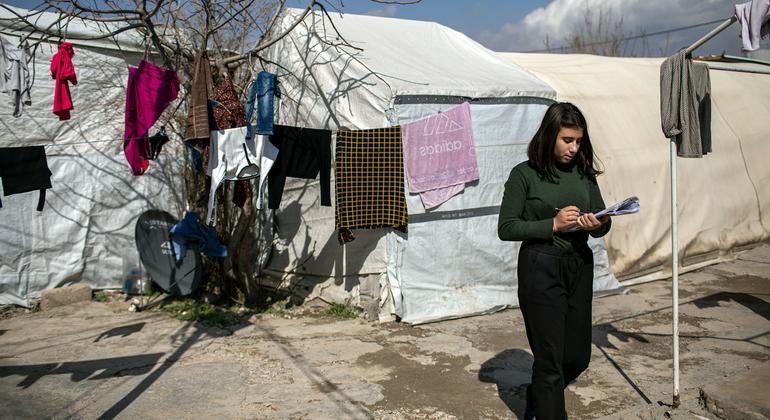ISIL, also known by the Arabic moniker, Daesh, conducted a genocidal campaign against the Yazidis, whose historic homeland is the northern town of Sinjar.
The atrocities they committed included sexual violence, mass executions, forced conversions, and other crimes.
Trauma and perseverance
“As we commemorate this traumatic page of Iraqi history, we renew our commitment to peace and stability for the Yazidis and the people of Sinjar,” the UN Office in Iraq said in a statement.
“We salute the Yazidis’ resilience in preserving their culture and heritage despite ISIL attempts to erase them, and in spite of the countless challenges the community continues to face. We shall not forget those who were killed, injured or traumatized, nor those who remain missing: the search for them must continue until this painful chapter is closed.”
Eight years on, thousands of Yazidis have yet to return to their families and loved ones. Many continue to suffer mental anguish after years of captivity, torture, sexual violence and slavery, as well as profoundly inhumane treatment.
Countless more are still struggling to come to terms with the loss of beloved relatives, or even their entire families.

Reza / Webistan
View of the Kabarto refugee camp, now home to many of the Yazidi forced to flee the city of Sinjar, taken by ISIS on August 3rd,2014
Homeland still unstable
“Meanwhile, many Yazidis remain displaced from their places of origin. Due to continuing tensions, their ancestral homeland in Sinjar is still deprived of the essential stability needed to rebuild their lives, free of fear and intimidation,” the statement said.
The UN has stressed that peace, development, and accountability are key for the Yazidi community to flourish, while also highlighting the Iraqi Government’s role.
“It must be clear that it is everyone’s responsibility to work relentlessly to ensure that the ongoing plight of the Yazidis ends now, and that every effort is made to provide the people of Sinjar with opportunities for a better future,” said the statement.
“The State is an umbrella for all, and its authority is the guarantor for every citizen of this country, irrespective of political affiliation, religion, or ethnic group. No Yazidi, nor any other Iraqi, should be a pawn in local or regional power competition.”
In October 2020, the Iraqi authorities and the Kurdistan Regional Government in the north, signed an agreement on the status of Sinjar district. Since ISIL’s military defeat, victims and survivors have faced obstacles due to discord over security arrangements, provision of public services, and the lack of a unified administration.
The Sinjar Agreement must be fully implemented, the UN Office said. “Stable governance and security structures are vital. It will allow the displaced to finally return home, reconstruction efforts to be accelerated, and public service provision to be improved.”
Momentum for accountability
The UN will continue to promote accountability for ISIL crimes against the Yazidis, noting that “freedom and justice go hand in hand with peace and development.”
There has been increased momentum for prosecutions, the UN team investigating ISIL crimes, known as UNITAD, reported on Wednesday.
“Since last year’s commemoration, we see progress in the form of legal precedents for prosecution for the crime of genocide in German courts, the opening, and excavations of additional mass graves of Yazidi ISIL victims in Qeni and Hardan, Sinjar; and the completion of the second return of remains, while the work continues to identify the remains of more victims.”

© UNICEF/Lindsay Mackenzie
Many Yazidi families fled their homes and took refuge in the Bajet Kandala camp for internally displaced people in northern Iraq. (file)
Courage and resilience
Christian Ritscher, Special Adviser and Head of UNITAD, stressed that this momentum was mostly inspired by the courage and resilience of Yazidis themselves, in Iraq and around the world.
The courage and perseverance of Yazidi women and girls, in particular, has been exceptional and humbling, he said, adding that their determination for justice and accountability is driving efforts towards investigations.
Mr. Ritscher recalled a visit to Sinjar in May, where he met with “brilliant” young Yazidis.
“I was truly inspired by the steadfastness and the persistence of those young women and men, who have survived unimaginable horror, to come forward and speak up about the gravity of the brutalities that befell them, as well as their trust and belief in the path of accountability and justice,” he said.
“The young women and men of the Yazidi community deserve to be recognized for what they have endured and continue to endure, yet their ability to rise, develop, and take their future into their own hands is genuinely impressive.”
International support for justice
According to a post on Twitter, Mr. Ritscher was in Stuttgart, Germany, on Wednesday, where he met with Nobel Laureate Nadia Murad, the Yazidi survivor who has long advocated for justice for her community,
UNITAD believes the momentum towards justice and accountability will continue to increase through the unanimous support of the international community, which stands strong behind the pursuit of accountability for ISIL crimes.
The Iraqi Government and numerous countries have shown unwavering support for their investigations throughout the past year.
Last November, a regional court in Germany delivered the first conviction of an ISIL member for war crimes, crimes against humanity and genocide. UNITAD supported prosecutors by engaging with witnesses in Iraq and helping to confirm the fraudulent documents presented by the defendant.
Mr. Ritscher stated that as collaborative efforts grow, victims and survivors will be brought closer to getting the justice they so deserve.
“Through partnerships across national authorities, UNITAD, impacted communities and non-governmental organizations, we can overcome the many hurdles faced in delivering justice for ISIL crimes” he said.

